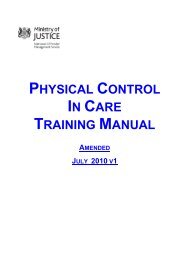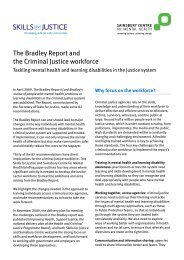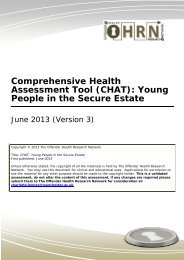Engendering Justice - from Policy to Practice - The Fawcett Society
Engendering Justice - from Policy to Practice - The Fawcett Society
Engendering Justice - from Policy to Practice - The Fawcett Society
- No tags were found...
Create successful ePaper yourself
Turn your PDF publications into a flip-book with our unique Google optimized e-Paper software.
Some magistrates noted that they felt as females thatthey were treated differently by male colleagues and oftenafforded less respect. As one described:On one of my early sittings I was handed paperwork (presentencereports, means forms, court listings, etc.) by the(male) chairman of the bench <strong>to</strong> carry for him. I remindedhim that they were his papers, since I already had my ownset – he said ‘No, I want you <strong>to</strong> give them <strong>to</strong> the Clerk.I had the distinct impression I was being treated as hissecretary because I was female and relatively young. 254However, most responses indicated that females weretreated on an equal footing with their male counterparts andthat there had been a definite improvement over the years.I think the opinion of female magistrates, as being “twinset & pearls” that had <strong>to</strong> “do” something no longer existsas it did…16 years ago. I feel completely equal <strong>to</strong> mymale colleagues – whether they like it or not. 255<strong>The</strong> gender balance within the Magistracy allows forwomen <strong>to</strong> be well represented on the bench and this wasconsidered important by most magistrates who shared theirviews with the Commission. <strong>The</strong> challenge is for this femalerepresentation <strong>to</strong> be replicated in the judiciary.ProbationAlthough the probation service is a female dominatedprofession and has a significantly better gender balance atsenior levels than other criminal justice agencies (67.53%of probation service staff are women and 19 out of 40 chiefofficers of probation are women) 256 , female employees stillexperience discrimination. For example, women <strong>to</strong>ld theCommission that they had felt disadvantaged after takingcareer breaks due <strong>to</strong> caring responsibilities. Additionallylong working hours, particularly evening work, alsoimpacted on family life.my children were young and at school…any family crisiswould be accommodated by probation.” 257 Many probationservices provided the Commission with examples of theirgender equality schemes.A recent study by the Centre for Crime and <strong>Justice</strong> Studiesconcluded that although in real terms the budget of theprobation service has increased more than other criminaljustice agencies, the notable decline in qualified staff andtrainees and the significant structural changes has seen theworkload of qualified probation officers and all main gradeofficers increase by 28 percent and 35 percent respectivelyin the period 2002-2006. 258 <strong>The</strong> stresses associated withan increased workload are likely <strong>to</strong> particularly impac<strong>to</strong>n women with caring responsibilities and this should becarefully moni<strong>to</strong>red.Given the female-dominated nature of the probationservice, there has been less research around discrimina<strong>to</strong>rypractices. However, women working in the probationservice <strong>to</strong>ld the Commission that they faced obstacles due<strong>to</strong> the male-defined nature of the criminal justice system. Asone senior probation officer remarked, “the criminal justicesystem and probation is very male orientated and machowith more value placed on male macho/male qualities.” 259This male-defined culture is also reflected in the nature ofprogrammes which are available <strong>to</strong> female offenders, asnoted in Chapter Three.Respondents also commented that the particular skills theybrought <strong>to</strong> their role in the probation service as womenwere often not acknowledged. As one probation officerstated concerning what she would change about thesystem “Recognition that both male and female workershave an important role <strong>to</strong> play in the probation servicebecause of their differences and not despite them.” 260HM Inspec<strong>to</strong>rate of Probation should carry out a thematicinspection on sex equality <strong>to</strong> help pinpoint discrimina<strong>to</strong>rypractices and cultures that female employees experience.However, there was recognition that the probation servicewas fairer <strong>to</strong>wards women than many other professions.As one case administra<strong>to</strong>r remarked, “I have worked forProbation for seventeen years, I worked part-time whenPage 77
















